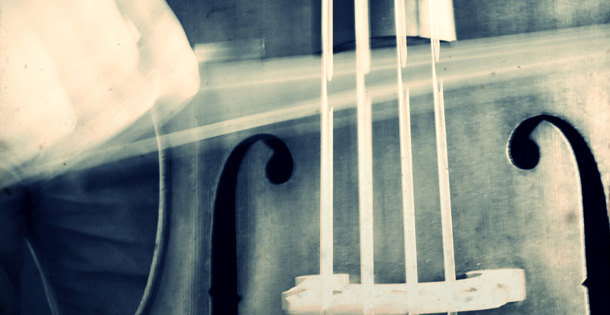“Not at all,” Danny said. String instruments, he explained, require frequent playing or they lose the quality of their sound. When laid aside, even for a day or two, they must be “limbered up” again, “brought alive.”
“You owe it to the cello to be played.”
With some trepidation I tried a lesson. It was hard. My bowing arm and fingering hand were clumsy. Musical notes and notations made up a brand new language of which I had no clue: octaves, trebles, sharps and flats, key signatures — black blobs on each page, dispersed within, above, and below five horizontal lines. The challenge was to match what I saw on the score with what my fingers did, listen to the resulting sounds — mostly incorrect — and try again. A variety of playing techniques made things even more complex: pizzicato, tremolo, vibrato, sul ponticello — whose pretty names belied their difficulty to be mastered. My bowing arm and fingering hand got charley horses.
While I struggled with each lesson, my teacher gazed longingly at the cello.
“It’s beautiful,” she said. “Gorgeous tone. Where did you get it?”
I mumbled something vague. “… just on loan … lucky to have it for awhile … owner an acquaintance …”
The identity of that acquaintance and his whereabouts were still unknown despite my frequent checking back with all potential information sources. “No, no one reported a cello missing … no one responded to our notice,” they all said.
Two years had passed since my return from Aspen, during which the cello acquired a magnetic force, constantly drawing me to it. Practicing became a pleasure. Black blobs on scores gradually transformed into meaningful music, rich in emotion and sensuality. I produced more mellow tones than discordant squeaks, approaching what composers had intended. While busy with routine daily tasks, I longed for the familiar feel of cello strings beneath my fingers, the calming rhythm of my bowing arm, the smell of rosin wafting up to my nostrils. Orchestral melodies reverberated in my head as I gathered groceries, folded laundry, answered emails. Yet beneath it all was the relentless leitmotif: This cello isn’t mine.
“It’s time … you’re good enough,” my teacher said as we finished up one lesson. She wanted me to join three other students — two violinists and a violist — in a string quartet.
A big smile spread across my face. Then disappeared.
“I can’t take this cello out … it might get lost or injured.” (By now I thought of the instrument as a friend, something alive.) “It’s just on loan.”
“I’ll drive you there and back myself,” the teacher said, “door to door. The cello will be safe in my car and you’ll have it with you all the time.”
It took some convincing; finally I agreed.
Become a Saturday Evening Post member and enjoy unlimited access. Subscribe now




Comments
Very enchanting and magical tale.
What an exciting first! The story read like fact until the very end. It had me on the edge of my chair until the denouement and reminded of O. Henry.